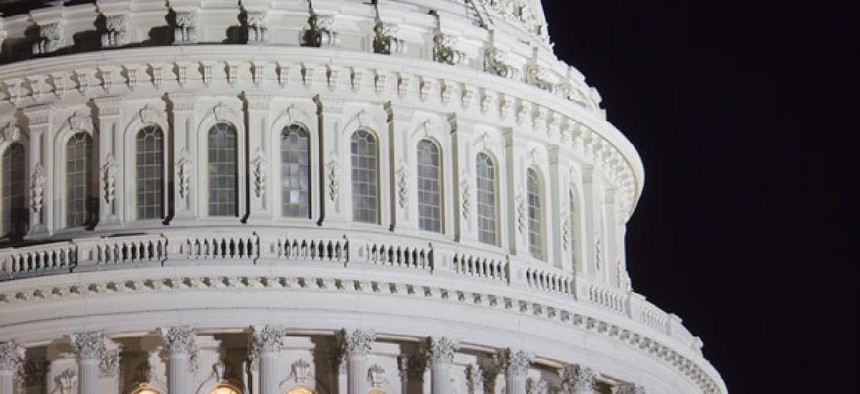
Mesut Dogan/Shutterstock.com
Congress Ineffectively Oversees National Security, Insiders Say
Only one-fourth in a National Journal survey felt lawmakers were effective checks.
Three-quarters of National Journal's National Security Insiders said Congress ineffectively oversees the executive branch's national security programs.
"Congress has for years been a lapdog to the executive branch and does not exercise much meaningful oversight over national security programs," one Insider said. There is too much to oversee, and Congress has no real expertise, another added. "Politicization means that there is no agreement on what 'oversight' means." Some blamed partisan politics for the problem. "It is not possible to provide adequate oversight when viewing national security through tinted, extremely partisan views. National security suffers when not approached in a bipartisan view."
One-quarter of Insiders disagreed, saying Congress is effective at checking the executive branch on security issues, at least to some degree. "Congressional committees dealing with national security have mostly dedicated members and strong staffs, and committees have stronger bipartisan traditions than do those in other areas," one Insider said. "A weakness, however, is that the Congress abets populist politics by managing one scandal at a time and obsessing on protection of spending in members' districts and states." Another Insider pointed out that lawmakers' control is limited. "I believe that some do as well as they can, considering the executive branch controls the keys to the information vaults."
Does Congress play an effective oversight role over the executive branch's national security programs?
(50 votes)
- No 74%
- Yes 26%
No
"Too many members of Congress are intimidated by national security. The rapid turnover in recent years has diminished the bench of members with the experience and confidence to engage with the executive branch on these issues."
"Congress could play an effective role with its constitutional appropriations authority but rarely uses the power it has at
its disposal."
"Congress has lost its way in real oversight. Their role now is narrow and reactive. Not only do they fail to offer solutions, they don't even try to define the problem well."
"In my experience, they are easily bulldozed by skilled briefers."
"In my job, we visit the Hill. We literally had a congressman tell the class that congressmen don't have time for national security and it's not important. The fact that Congress hasn't declared war, its most sacred duty, since 1942 [when it declared war on Bulgaria, Hungary, and Romania] should tell us something."
"It used to. It is now that body that engages in random acts of after-sight, and partisan at that. It complains more than it oversees."
"As with almost every other aspect of public policy, severe partisanship overcomes the work of Congress."
"Under the previous administration, but no longer."
"The initial abdication came during the Gulf of Tonkin. Only worse since. Cowardice over taking responsibility for potential disasters sustains the status quo."
"But it rarely has. The Constitution sets up a natural conflict, and that has never really done much for 'oversight.' It has [been] worsened, however, by the declining quality of Hill staff. The old adage was, there were two types on the Hill—those who want to do something and those who want to play games. The games-players—often frustrated former program staffers—head to the Hill to inflict their often ill-informed opinions."
"You must be joking. They are entirely (politically) rational in
their near-total negligence of their constitutional obligations. Why
take risks?"
Yes
"On national security, the Congress ought to be more dispassionate
and exercise prudent, long-term risk management."
"It depends on the meaning of 'effective,' doesn't it? It also depends on the committee. Overall, probably good enough to usually satisfy minimal constitutional requirements, but frequently bureaucratic, burdensome, and overly political."
"But, thankfully, we have a two-party system to ensure there is
genuine oversight."
National Security Insiders: Gordon Adams, Charles Allen, Thad Allen, James Bamford, David Barno, Milt Bearden, Peter Bergen, Samuel "Sandy" Berger, David Berteau, Stephen Biddle, Nancy Birdsall, Marion Blakey, Kit Bond, Stuart Bowen, Paula Broadwell, Mike Breen, Mark Brunner, Steven Bucci, Nicholas Burns, Dan Byman, James Jay Carafano, Phillip Carter, Wendy Chamberlin, Michael Chertoff, Frank Cilluffo, James Clad, Richard Clarke, Steve Clemons, Joseph Collins, William Courtney, Lorne Craner, Roger Cressey, Gregory Dahlberg, Robert Danin, Richard Danzig, Daniel Drezner, Mackenzie Eaglen, Paul Eaton, Andrew Exum, William Fallon, Eric Farnsworth, Jacques Gansler, Stephen Ganyard, Daniel Goure, Mike Green, Mark Gunzinger, Jim Harper, Michael Hayden, Michael Herson, Pete Hoekstra, Bruce Hoffman, Paul Hughes, Colin Kahl, Donald Kerrick, Rachel Kleinfeld, Lawrence Korb, David Kramer, Andrew Krepinevich, Charlie Kupchan, W. Patrick Lang, Cedric Leighton, James Lindsay, Justin Logan, Trent Lott, Peter Mansoor, Ronald Marks, Brian McCaffrey, Steven Metz, Franklin Miller, Philip Mudd, John Nagl, Shuja Nawaz, Kevin Nealer, Michael Oates, Thomas Pickering, Paul Pillar, Stephen Rademaker, Marc Raimondi, Celina Realuyo, Bruce Riedel, Barry Rhoads, Marc Rotenberg, Kori Schake, Mark Schneider, John Scofield, Tammy Schultz, Stephen Sestanovich, Sarah Sewall, Matthew Sherman, Jennifer Sims, Constanze Stelzenmüller, Frances Townsend, Mick Trainor, Suzanne Spaulding, Ted Stroup, Tamara Wittes, Dov Zakheim, and Juan Zarate.
(Image via Mesut Dogan/Shutterstock.com)
NEXT STORY: Gallup’s Open Book







